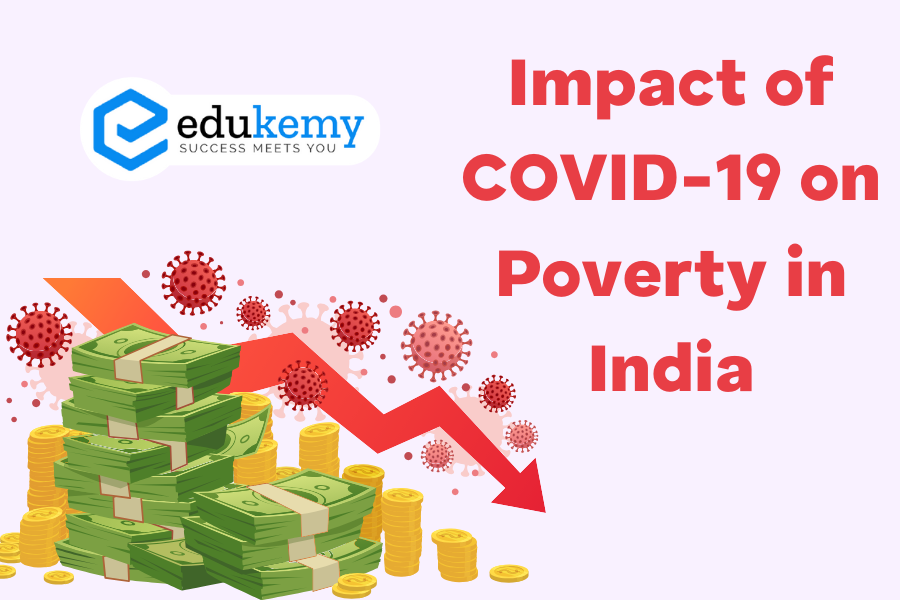
The COVID-19 pandemic has had severe socio-economic consequences globally, and India is no exception. Here are key points highlighting the impact of the pandemic on poverty in India:
- Estimates from the International Monetary Fund (IMF):
- Reports from the IMF, including the World Economic Outlook and Fiscal Monitor in October 2020, projected that around 40 million people in India could turn extremely poor due to the economic fallout of the pandemic.
- Disproportionate Effect on Low-Income Households:
- Low-income households have borne a disproportionate impact due to their concentration in the informal sector, vulnerability to job losses, lower financial savings, and limited access to healthcare.
- Employment in Small Firms:
- Prof. Arvind Panagariya’s book “New India: Reclaiming the Lost Glory” highlighted that 92.4% of workers in India are employed in small firms (1-50 workers), making social protection absent for a significant portion of the workforce.
- Global Hunger Index (GHI) 2020:
- India was ranked 94 out of 107 in the Global Hunger Index 2020. The report warned that the COVID-19 pandemic could worsen indicators such as undernourishment, child wasting, child stunting, and child mortality.
- Economic Contraction and GDP Growth:
- India’s GDP growth for the April-June 2020 quarter crashed to minus 23.9%. The Reserve Bank of India (RBI) estimated the GDP growth for the entire fiscal year to be minus 9.5%, indicating a significant economic contraction.
- Government Response:
- The Central Government initiated relief packages, including the Pradhan Mantri Garib Kalyan Yojana (PMGKY) and the Atmanirbhar Bharat package. State governments also introduced additional measures for migrant workers, construction workers, below poverty line (BPL) individuals, and low-income households.
- Challenges in Delivery of Social Protection:
- Challenges in the effective distribution of social protection benefits included insufficient staffing, funding, and training of local-level government bodies. Information asymmetry, insufficient performance-based incentives for local agents, and delivery issues with Common Service Centres were also noted.
- Issues with Direct Benefit Transfers:
- Issues with Direct Benefit Transfers (DBT) included exclusion errors, unbanked beneficiaries, challenges in complying with KYC requirements, administrative errors, Aadhaar seeding issues, and authentication failures. The Fair Price Shop (Public Distribution System, PDS) beneficiaries were chosen based on a poverty line that might not accurately reflect the socio-economic status.
- Need for Resolution:
- The identified challenges need resolution for better delivery of relief measures, ensuring that benefits reach the intended recipients without exclusion errors.
Addressing these challenges is crucial for effective and inclusive social protection, especially during times of crisis such as the COVID-19 pandemic.
Contents
- 1 FAQs
- 1.1 Q: How has COVID-19 impacted poverty in India?
- 1.2 Q: What sectors of the Indian economy have been most affected by COVID-19 in terms of poverty?
- 1.3 Q: How has the Indian government responded to the increase in poverty caused by COVID-19?
- 1.4 Q: What are some long-term implications of COVID-19 on poverty alleviation efforts in India?
- 1.5 Q: How can international organizations contribute to addressing the impact of COVID-19 on poverty in India?
- 2 In case you still have your doubts, contact us on 9811333901.
FAQs
Q: How has COVID-19 impacted poverty in India?
A: COVID-19 has exacerbated poverty in India by disrupting livelihoods, causing job losses, and pushing vulnerable populations deeper into economic hardship.
Q: What sectors of the Indian economy have been most affected by COVID-19 in terms of poverty?
A: The informal sector, including agriculture, construction, and small-scale industries, has been hit hardest by COVID-19, leading to widespread job losses and income reduction among the poor.
Q: How has the Indian government responded to the increase in poverty caused by COVID-19?
A: The Indian government has implemented various relief measures, including direct cash transfers, food distribution programs, and employment guarantee schemes, to mitigate the impact of COVID-19 on poverty-stricken populations.
Q: What are some long-term implications of COVID-19 on poverty alleviation efforts in India?
A: COVID-19 may lead to setbacks in poverty alleviation efforts in India by widening income disparities, increasing indebtedness among the poor, and hindering access to education and healthcare, especially for marginalized communities.
Q: How can international organizations contribute to addressing the impact of COVID-19 on poverty in India?
A: International organizations can support India’s efforts to combat poverty exacerbated by COVID-19 by providing financial assistance, technical expertise, and resources for healthcare infrastructure, social protection programs, and economic recovery initiatives.
In case you still have your doubts, contact us on 9811333901.
For UPSC Prelims Resources, Click here
For Daily Updates and Study Material:
Join our Telegram Channel – Edukemy for IAS
- 1. Learn through Videos – here
- 2. Be Exam Ready by Practicing Daily MCQs – here
- 3. Daily Newsletter – Get all your Current Affairs Covered – here
- 4. Mains Answer Writing Practice – here

